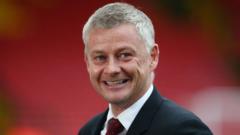Should Solskjaer Get More Respect for His Manchester United Tenure?

Published: 2025-11-19 13:00:24 | Category: sport
In reflecting on Ole Gunnar Solskjaer's tenure as Manchester United manager, it's evident that his time at the helm was marked by both significant achievements and notable shortcomings. Despite securing a commendable win rate of 54.2% and guiding the team to the highest league finishes since Sir Alex Ferguson's departure, the absence of silverware and his eventual dismissal have led to a complex legacy. As Manchester United continues to rebuild under new management, it raises the question of whether Solskjaer's contributions have been undervalued.
Last updated: 19 October 2023 (BST)
What’s happening now
As of now, Manchester United finds itself in a state of cautious optimism following a recent unbeaten run of five matches, placing them seventh in the Premier League and just two points behind third-placed Chelsea. The club is undergoing a significant revival under new leadership, with fans and analysts alike beginning to reassess Solskjaer's previously scrutinised managerial period. The team's resilience and ability to secure late equalisers suggest a newfound determination, which many believe could be the foundation for future success.
Key takeaways
- Solskjaer achieved a win rate of 54.2% during his managerial stint.
- He was pivotal in creating a positive atmosphere at Old Trafford post-Mourinho.
- Despite high finishes, Solskjaer failed to secure any silverware.
- His dismissal followed a series of poor performances, including a heavy loss to Watford.
- Recent performances indicate a potential turning point for the club.
Timeline: how we got here
Here’s a brief overview of key dates and events surrounding Ole Gunnar Solskjaer’s time at Manchester United:
- December 2018: Solskjaer appointed as interim manager after Jose Mourinho's dismissal.
- March 2019: Solskjaer’s initial success sees him given a permanent contract.
- July 2021: Contract extension granted, with expectations of long-term success.
- September 2021: Cristiano Ronaldo returns to the club, sparking initial excitement.
- November 2021: Solskjaer dismissed following a poor run of results, including a 4-1 defeat to Watford.
What’s new vs what’s known
New today/this week
Recent discussions among fans and analysts suggest a growing appreciation for Solskjaer's impact on the club’s culture during his time as manager. His ability to foster a positive environment is being recognised as a crucial aspect of his tenure.
What was already established
It was previously established that Solskjaer had a solid understanding of the club's ethos, having been a player there himself. While his managerial record included notable victories, the lack of trophies has often overshadowed his achievements.
Impact for the UK
Consumers and households
The ongoing evolution of Manchester United impacts not only fans but also local businesses and communities. As the club performs better, there's a corresponding boost in local commerce, with increased matchday attendance and related spending in the vicinity of Old Trafford.
Businesses and jobs
For businesses connected to the club, from merchandise vendors to hospitality services, a successful United translates to better economic prospects. Improved team performance can lead to higher job security and even expansion opportunities for local enterprises.
Policy and regulation
In terms of governance, the club's leadership changes could prompt discussions about policy reforms within the Premier League, particularly concerning club management and financial regulations. Stakeholders may look to ensure that clubs like Manchester United are not only performing well on the pitch but are also maintaining ethical standards off it.
Numbers that matter
- 54.2%: Solskjaer's win rate as Manchester United manager.
- 91: Total wins in 168 matches under his management.
- 73: Goals scored during the 2018-19 season, the highest since 2013.
- 5: Semi-finals reached in cup competitions during his tenure.
- 4: Major players signed in the summer of 2021, including Cristiano Ronaldo, Jadon Sancho, and Raphael Varane.
Definitions and jargon buster
- Interim manager: A temporary position held until a permanent manager is appointed.
- Win rate: The percentage of matches won compared to total matches played.
- Albatross: A term used to describe a burden or hindrance; in this context, it refers to the pressure of not winning trophies.
How to think about the next steps
Near term (0–4 weeks)
Manchester United must maintain momentum in their current unbeaten run, focusing on tactical coherence and player fitness. Observers will be watching closely how the team responds to upcoming fixtures.
Medium term (1–6 months)
As the season progresses, the club’s management will need to refine strategies to balance player performance and team cohesion. Success in cup competitions will be a priority to alleviate some of the historical pressure regarding silverware.
Signals to watch
- Upcoming fixtures and match results will be critical indicators of the team’s progress.
- Player performance metrics, including individual contributions and team dynamics.
- Management decisions, particularly regarding player recruitment and retention.
Practical guidance
Do
- Support the team through both victories and defeats to foster community spirit.
- Stay informed about club developments and player performances.
- Engage with local businesses during match days to boost the local economy.
Don’t
- Disregard the club’s history and the impact of past managers on its culture.
- Overlook the importance of player morale and team dynamics.
- Assume that managerial changes alone will solve underlying issues.
Checklist
- Follow club news and updates regularly.
- Engage with fellow fans to share insights and experiences.
- Attend matches to support the team in person.
- Explore merchandise and local offerings to support the club's economy.
- Participate in discussions about the club’s future direction.
Risks, caveats, and uncertainties
While the current optimism surrounding Manchester United is palpable, it is essential to acknowledge the risks involved. Changes in management can lead to instability, and the pressure to deliver results can create a challenging environment. Furthermore, the unpredictability of player performance and injuries can significantly affect outcomes. Observers should remain cautious about overestimating the team's potential based solely on recent performances.
Bottom line
Ole Gunnar Solskjaer's time at Manchester United was a complex blend of highs and lows. His positive impact on team morale and culture cannot be overlooked, despite the lack of trophies. As the club continues to rebuild, it is vital to appreciate the foundational work he laid while also recognising the challenges that lie ahead. The journey for Manchester United remains ongoing, and the lessons learned during Solskjaer's reign will undoubtedly shape the club's future.
FAQs
What was Ole Gunnar Solskjaer's win rate as Manchester United manager?
Ole Gunnar Solskjaer achieved a win rate of 54.2% during his time as Manchester United manager, winning 91 out of 168 matches.
Why was Solskjaer dismissed as manager?
Solskjaer was dismissed following a series of poor performances, including a heavy defeat to Watford, which raised concerns about team cohesion and strategy.
What are the key achievements of Solskjaer's tenure?
During his tenure, Solskjaer secured the highest league finishes since Sir Alex Ferguson's era and reached five semi-finals in cup competitions, although he did not win any trophies.



